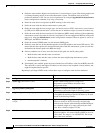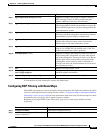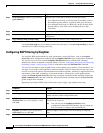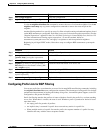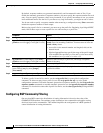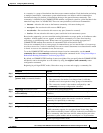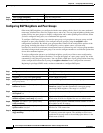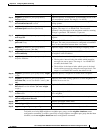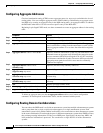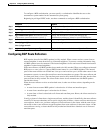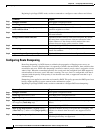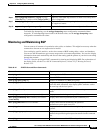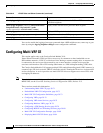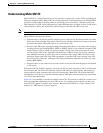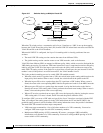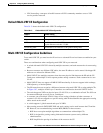
38-66
Cisco Catalyst Switch Module 3110 and 3012 for IBM BladeCenter Software Configuration Guide
OL-12189-01
Chapter 38 Configuring IP Unicast Routing
Configuring BGP
Configuring Aggregate Addresses
Classless interdomain routing (CIDR) creates aggregate routes (or supernets) to minimize the size of
routing tables. You can configure aggregate routes in BGP either by redistributing an aggregate route
into BGP or by creating an aggregate entry in the BGP routing table. An aggregate address is added to
the BGP table when there is at least one more specific entry in the BGP table.
Beginning in privileged EXEC mode, use these commands to create an aggregate address in the routing
table:
To delete an aggregate entry, use the no aggregate-address address mask router configuration
command. To return options to the default values, use the command with keywords.
Configuring Routing Domain Confederations
You can reduce the IBGP mesh is to divide an autonomous system into multiple subautonomous systems
and to group them into a single confederation that appears as a single autonomous system. Each
autonomous system is fully meshed within itself and has a few connections to other autonomous systems
in the same confederation. Even though the peers in different autonomous systems have EBGP sessions,
they exchange routing information as if they were IBGP peers. Specifically, the next hop, MED, and
local-preference information is preserved. You can then use a single IGP for all of the autonomous
systems.
Command Purpose
Step 1
configure terminal Enter global configuration mode.
Step 2
router bgp autonomous-system Enter BGP router configuration mode.
Step 3
aggregate-address address mask Create an aggregate entry in the BGP routing table. The aggregate
route is advertised as coming from the autonomous system, and the
atomic aggregate attribute is set to show that information might be
missing.
Step 4
aggregate-address address mask as-set (Optional) Generate autonomous-system set path information. The
command creates an aggregate entry following the same rules as the
previous command, but the advertised path is an AS_SET consisting
of all elements contained in all paths. Do not use this keyword when
aggregating many paths because this route must be continually
withdrawn and updated.
Step 5
aggregate-address address-mask
summary-only
(Optional) Advertise only summary addresses.
Step 6
aggregate-address address mask
suppress-map map-name
(Optional) Suppress selected, more specific routes.
Step 7
aggregate-address address mask
advertise-map map-name
(Optional) Generate an aggregate based on conditions specified by
the route map.
Step 8
aggregate-address address mask
attribute-map map-name
(Optional) Generate an aggregate with attributes specified in the
route map.
Step 9
end Return to privileged EXEC mode.
Step 10
show ip bgp neighbors [advertised-routes] Verify the configuration.
Step 11
copy running-config startup-config (Optional) Save your entries in the configuration file.



